 |
Here's an interview that I have not seen before, and it was done in March. He talks about a lot of good stuff. Enjoy....
Michael Emerson
Interviewed by Mark Sells March 2007
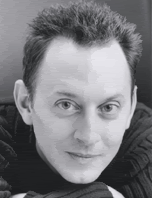 "I'm a little off my agenda," says Michael Emerson from his comfy Hawaiian villa. And no, he's not talking about getting stuck on a remote island in "Lost." A classically trained, Emmy Award winning actor with amazing character turns in film and television, Emerson looks to return to the stage as Prospero or Leer. "My agenda has always been that when I am an old man, I will be playing those classical parts." And for good reason.
"I'm a little off my agenda," says Michael Emerson from his comfy Hawaiian villa. And no, he's not talking about getting stuck on a remote island in "Lost." A classically trained, Emmy Award winning actor with amazing character turns in film and television, Emerson looks to return to the stage as Prospero or Leer. "My agenda has always been that when I am an old man, I will be playing those classical parts." And for good reason.
In 1993, Emerson entered the Alabama Shakespeare Festival's Master of Fine Arts program and began a career on stage. He went to
A reputation that led to Benjamin Linus, aka the ring leader of the Others, on the ABC hit series, "Lost." Deliciously manipulative and maniacal, Emerson is the big reason to watch. And in the midst of a hectic production schedule, he was kind enough to share some of his secrets and theories, not to mention Ben's devious plans for Season 3. Whether slightly off his agenda or stranded on some remote jungle island, Michael Emerson always adds a touch of class.
Reel Questions, Reel Answers
One of the turning points in your career came in 1993, when you chose to pursue a Master of Fine Arts (
Before 1993, I was piecing together about a half of a grown up's living out of about 8 or 10 different pursuits. One of 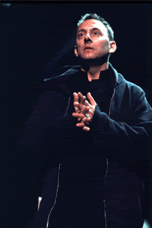 them being acting. And I also did a low level of carpentry and a little teaching. I was still doing a little illustration, which was my previous career. But I wasn't exactly thriving on any of those fronts.
them being acting. And I also did a low level of carpentry and a little teaching. I was still doing a little illustration, which was my previous career. But I wasn't exactly thriving on any of those fronts.
I knew that there was one thing that I wanted to do and that was to pursue a career in the classics on stage. And when I heard about this training program at the Alabama Shakespeare Festival, it looked to me like that was the answer to my dreams. That this was a way for me to withdraw from the mad scramble of my so-called career and be able to focus on something that I was interested in and that I felt passionate about.
Now, it did involve some sacrifices. One of them was freedom of movement. It meant moving to
But in the end, I got through it. And I was glad to have done it because it was tremendously focused and it took me off the treadmill of my former life.
A lot of your early performances before television were comedic in nature. And now, it seems, you're on a serious dramatic streak, from "Saw" to "The Practice" to "Lost." What is it about a particular role that attracts you?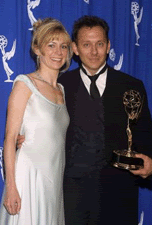 Up until this point, the thing that I preferred was to get a paycheck to tell you the truth! I've sort of taken whatever came my way.
Up until this point, the thing that I preferred was to get a paycheck to tell you the truth! I've sort of taken whatever came my way.
And it's not really clear in my mind how I ended up with these dangerous characters that I've been playing in recent years. Because previously, in my life on the stage, those wouldn't have been the kind of characters I played. I usually played funny guys, as comedy was always my specialty. And because I wasn't built in the heroic, cowboy vain, I was more likely to play character turns, which were eccentrics or silly.
So, it's a little mystifying to me how I end up playing these parts that I do. Except that people like the tension between the mild mannered package and the possible danger lurking within. That's a nice kind of dramatic tension.
Who or what motivates and inspires you as an actor today?
I like to see actors do great character turns. Guys that are willing to think themselves into a part, who can handle 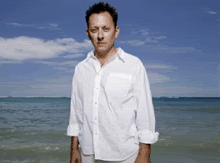 language. I always admire an actor who can play with elevated text; someone who can do classical work and make it seem natural. Speak Shakespeare.
language. I always admire an actor who can play with elevated text; someone who can do classical work and make it seem natural. Speak Shakespeare.
Even this part I have on "Lost." Ben is an articulate character. He speaks well and speaks slightly formally. I like that about him. And I also think it's one of the factors why people find him a little forbidding.
It almost seems that in a previous life, Ben would have been a psychologist.
I think he definitely has a strong grounding in psychology. That's one of his many areas of expertise, I think.
How did you land on "Lost?" What was the audition like?
For once, there was no audition process. For once, it came as an offer. And I have to say, that's really unusual in my career. But the offer wasn't as grand as the thing has played out. I was originally supposed to do a guest turn on the show. I think, three episodes, and then go away. But I think when they saw what they had, in terms of the function of this character, whether intentional or not, they had found their right villain for the show. Their right antagonist. I think they liked that and found that it was easy to run with. And they kept me around, which was a surprise.
Was there a particular role that they had seen to signal the offer?
I think they had seen my work on "The Practice." That serial killer or "might be" serial killer had some of the qualities they were looking for in this character, which was a sort of eerie ambiguity.
You arrived on the set in the middle of the series, rather than the very beginning. What was your experience like early on? And what is the experience like now that your character is more established?
Early on, it was like being dropped into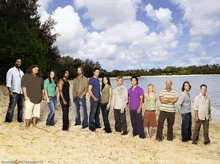 a big vat of ice water. You fly to
a big vat of ice water. You fly to
But you get used to it after doing years of guest spots on television shows. You get accustomed to being the new guy, the odd man out, the guy that's only going to be around for a few days.
So I take it, now you know where the restrooms are?
I do. I know where everything is now (Pauses). I know where the bodies are hidden (Sinister laugh!).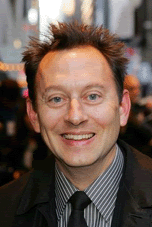
But it's much nicer now. Now it has a feeling of family. Now I'm working with friends. Now, I'm on the inside and it behooves me to be a good host when guest players come in and I can help to make them feel more comfortable and at home. Everybody works a little better if they feel welcome.
And I was certainly made to feel welcome, but my first day of work on this show just happened to be a hairy action day out in the wild. It was interesting. And I had been warned. People said 'Oh, man, I hear that "Lost" is rough work.' And they were right.
As you mentioned earlier, Henry Gale was originally slated for a handful of episodes in Season Two. What changed the producers' minds, allowing the character to become Benjamin Linus, leader of the Others?
They began to see that the thing they had cooked up was even better than they thought. They thought 'Oh, this may 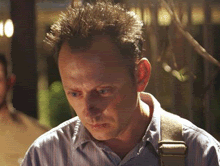 be the villain we've been looking for.' Because previously, there was no antagonist on the show. There were some 'murky' Others, there were some monsters, and the island itself. But the powers of evil, if you will, did not have a face or a voice until then.
be the villain we've been looking for.' Because previously, there was no antagonist on the show. There were some 'murky' Others, there were some monsters, and the island itself. But the powers of evil, if you will, did not have a face or a voice until then.
But they did have Mr. Friendly, of course (Laughs).
What do you feel are the dominant themes of "Lost?"
Clearly, one of the dominant themes is atonement. Everyone on the island, all the Lost-a-ways and possibly the Others too, have done wrong in their past. And now, under these extraordinary circumstances, whether natural or artificial, they have a chance to revisit or make up for things they've done in the past. That's one of the metaphysical, spiritual themes.
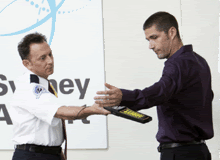
There are also ongoing adventure themes, like people being tested against the unknown, against the elements, against unidentified adversaries. That sort of thing. The human spirit that is a central theme to all adventure stories. That's also present.
And then there's science fiction themes that are going to become more important as time goes by. Things like genetics, conditioning, reproduction, things like that.
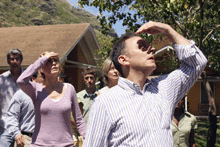 Do you believe in "six degrees of separation?"
Do you believe in "six degrees of separation?"
I have not personally ever seen it disproved. I mean six degrees is a tremendous amount of linkage if you're thinking in terms of the population of the globe.
It's sort of hard for me to imagine that I'm within six degrees of a yak herder in
Certainly, everyone on "Lost" is affected by far fewer than six links (Laughs)! I 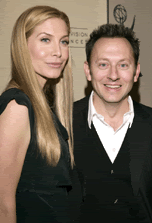 mean, there seems to be a pattern or a weave if you will, that is slowly rising to the surface and clarifying itself, of "uncanny connectedness." And this is going to pay off in a big way. For example, in the episode we're filming this week, two back-stories that we never connected in our minds before are going to collide and resolve in a huge, dramatic way.
mean, there seems to be a pattern or a weave if you will, that is slowly rising to the surface and clarifying itself, of "uncanny connectedness." And this is going to pay off in a big way. For example, in the episode we're filming this week, two back-stories that we never connected in our minds before are going to collide and resolve in a huge, dramatic way.
Which episode to date has been your favorite and why? Which has been the most challenging?
I enjoyed the episode last season where Jack brings me out to share breakfast with Locke and him ("Lockdown"). I liked that because it was funny and terrifying at the same time. It was sort of Henry/Ben revealing himself or his true colors in a way.
But there have been a bunch of good ones. This season, the fourth episode ("Every Man for Himself"), where I mess around with Sawyer's head and eventually take him up on the cliff to show him the other island. That was a fun episode because it had a lot of crazy, psychological hijinks in it. But it also had amazing settings. We had to go to some beautiful places to film that. And I just thought it was metaphysical, metaphorical, it involved literature, and it was just right.
Everyone has a theory about "Lost," from alien abductions to purgatory to snow globes. What is your theory about the island and its inhabitants? Or what's your favorite theory?
Everyone on the show has heard something more preposterous than anyone else. My favorite? Some guy told me that he thought that the island was the ruins of an alien zoo (Laughs).
Recently, I read a really plausible theory in the "Lost" magazine, but I can't remember the details of it. It wasn't a single unifying theory. It had several parts to it and it made me think about things I hadn't even thought of before. It at least gave me a template for a multi-part, complicated solution to the whole set up.
Of course, a lot of the metaphysical speculation was blown out of the water by the Season Two finale, which let us know that these events were happening in the real world in real time. So it wasn't the snow globe or purgatory, although I think purgatory is a really useful, working metaphor for the show. And that it's been sort of central to the show since the pilot. Because I'm going back through and watching all of the first season now and that's present in every episode and it's a really strong one. And maybe it's stronger for being metaphorical and not practical?
I think the real solution will be more science fiction. I think something's going on on that island whether it was found or created that has special scientific properties and that there's a battle over the power that is present there.
What's the one thing about the show that most people would be shocked to learn?
The show has such a grave tone that there's not a lot of hilarity or comedy exactly. And I think people would be surprised to know how much fun there is on the set when we're shooting it. The camera crew is hilarious. And there are numerous practical jokes and pranks that go on the set, which are fun (Laughs).
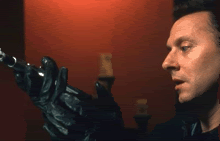 Have you ever been the victim of a practical joke?
Have you ever been the victim of a practical joke?
No, I haven't. I'm not that kind of guy. I've been in the theater for too many years. And not only do I not care for it, but I'm superstitious about it.
In the theater, you feel like the Gods are fickle. And they will not bear much teasing or playing around with. So, there's a sort of underlying gravity about the rituals of the theater. And I bring those with me when I do TV work. I don't goof off very much, but other people do, and it can be terribly amusing (Laughs).
I love this. Todd McFarlane's toy company recently announced that their next series of "Lost" characters will include a Henry Gale figurine. So, will you put one on your mantle?
I would not display it prominently in my home just because we don't have a very pop culture décor in our apartment. But I would be very pleased to see it and to own one. I think it will be fun. And maybe I'll keep it in the bedroom or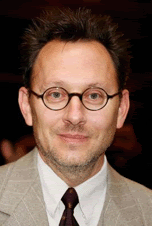 something? (Laughs).
something? (Laughs).
Do you know what sound clips are going to be on it? And were you involved in the design process?
They had three or four that they were going to pick from and they're all from those first few episodes of captivity. But I've already posed for it. You sit in a hotel room with this contraption on your head and they go around you with a laser scanner reader thing and it generates a three dimensional image of your face and head on a computer screen. And then you do different facial expressions and stuff. And they can make this perfect replica.
I'll be curious to see it when it's done. It was really an interesting process.
The McFarland figures are some of the most realistic around.
Yes, that John Locke one is about perfect. It looks really good. And then Jorge's is really convincing also.
In another interview, you mentioned that your wife is a Lost-a-holic and has been following the show since Season 1. With you on the show now, and especially with the crazy role you play, what does she think? Has her perspective on the show changed at all?
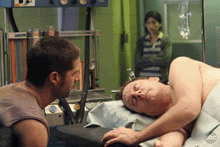 Yes, she has. She used to be one of those purists who didn't want any spoilers, didn't watch previews, didn't watch next week on "Lost." None of that stuff. She wanted the pure article. And at first, she didn't want to hear any spoilers from me, things that I knew or things that I was shooting. But now, I think she's softened up a bit and she doesn't mind being on the inside and being a step or two ahead of the viewing audience.
Yes, she has. She used to be one of those purists who didn't want any spoilers, didn't watch previews, didn't watch next week on "Lost." None of that stuff. She wanted the pure article. And at first, she didn't want to hear any spoilers from me, things that I knew or things that I was shooting. But now, I think she's softened up a bit and she doesn't mind being on the inside and being a step or two ahead of the viewing audience.
Does she cheer for your character?
She cheers for him the way actors cheer for other actors when they're doing a good job. I think she thinks he's creepy (Laughs). And I think she's happy that I'm very little like the character I play.
Sometimes she'll look over at me and say, "You are something else!" (Laughs). 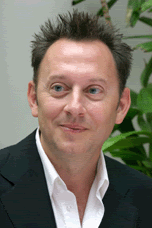
Speaking of Carrie, you've worked with your wife on numerous occasions ("Straight-Jacket," "Grace & Glorie," "The Journey") and even had a role in "29th and Gay," which she produced and directed. What's it like working with her?
I really like working with my wife because she's like this renaissance girl. She's a 'really' good actress. And if you've seen "Straight Jacket," you know what she can do. She's an extraordinary player and then she's also got a gift for ordering people around and being a director as well! And it's always a lot of fun.
And I have to say it's kind of a turn on for me to watch her be a director because she really takes charge. She really has answers for everything. She knows just what she's doing and it's really exciting.
Are you planning any future collaborations?
We're always going to be because we're both pretty good players and we like being in the same place at the same time. So, I'm sure other opportunities will come up.
Recently, Damon Lindelof met with ABC to discuss the longevity of the show, suggesting an end after four or five seasons (no more than 100 episodes). Regardless of when the show runs its course, where and what do you see yourself doing afterwards?
Well, I think the first thing I'll do when I know I have a stretch of time is to go get myself in a play somewhere. 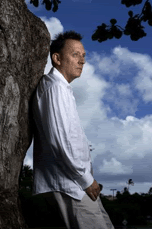 Because I'm a little off my agenda. My agenda has always been that when I am an old man, I will be playing those classical parts (Prospero, Lear, etc.). But in order to do that, I have to keep my hand in, I have to keep working that muscle. The memory, if nothing else. I need to be learning a lot of lines.
Because I'm a little off my agenda. My agenda has always been that when I am an old man, I will be playing those classical parts (Prospero, Lear, etc.). But in order to do that, I have to keep my hand in, I have to keep working that muscle. The memory, if nothing else. I need to be learning a lot of lines.
And you're not required to learn that much material when you're working on TV. So, you get a little lazy in the brain.
There's never a day when you're going to do more than five pages. And it won't be all of your lines. The memorization gets easy. So, I need to get back into the thick of really trying to learn big chunks of material and keep up the voice and body work which is required of you on stage.
Lastly, if you were writing the finale for Ben, how would you like it to end for him?
Wow! I guess I would like it to have an amazing twist. I would like us to find out that Ben was something so other than everything we thought of him. And I don't know what that would be exactly.
But I think it would be interesting to find out that he was something holy. That would be so off the wall. Or that he was a projection of the spirit of a five-year old Buddha! (Laughs).
SOURCE: The Reel Deal

No comments:
Post a Comment